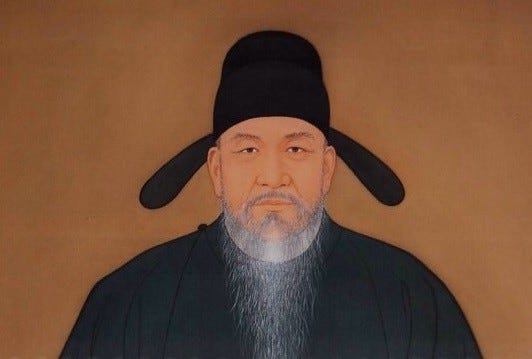The Curse of Primogeniture in Joseon Dynasty?
Primogeniture is not a word you come across everyday, not in the least. The word originates from the European tradition of feudalism in which the oldest son inherits most of the parents’ estate and title, if any. My understanding of it is that there were a few instances where the firstborn daughter sometimes enjoyed the privilege.
Without getting too technical with the history of Korea, Joseon (조선, 朝鮮) Dynasty (1392~1897) overthrew and succeeded Goryeo (고려, 高麗) Dynasty (918~1392) that was in bad shape all around. One of the defining differences between the two is that Goryeo espoused and revered Buddhism while Joseon rejected and downright forbade it in some situations. Joseon’s founding principle was based instead on Confucianism (유교, 儒敎) that shaped the country’s politics for centuries.

Primogeniture was a very important, if not the most important, issue for the founders/architects of Joseon Dynasty—they thought the system would give each King the legitimacy and thus stability, given the uncertain nature of a newly established nation. However, this word carries a slightly different meaning in the old Korean (Joseon) sense. The Korean primogeniture refers to the rights of succession for the firstborn (or, oldest surviving) son from the official, legitimate wife of the King, and cannot be from the King’s concubines. This person is called Jeok-jang-ja (적장자, 嫡長子), literally “oldest son from the Queen.” But as you can imagine, this becomes the source of confusion and much debate later on.
As fate would have it, it turned out that only 7 (or 8, depending on how you look at it) of the 27 Kings of Joseon were the firstborn jeok-jang-ja sons. They were:
5th: Moon-jong (문종)
Died when he was 37, 2 years after taking the throne. (story behind this one…)
6th: Dahn-jong (단종)
Became King at the age of 11 and died 3 years later. (tragic story…)
10th: Yeon-san guhn (연산군), remember him from my jeotgal posting?
Took the throne at the age of 18, overthrown at 29, died 2 months later.
12th: In-jong (인종)
Died within 7 months of becoming King at the age of 30. (rumors of foul play…)
18th: Hyun-jong (현종)
Died when he was 34.
19th: Sook-jong (숙종)
Only King on this list who lived a fairly long life (58 years). Had Henry VIII type of women issues, probably made into K-dramas more than any other King.
20th: Kyong-jong (경종)
Died when he was 35, 4 years after becoming King.
He’s sometimes on this list, and sometimes not because he was the firstborn son of a concubine.
This reads like one of those creepy stories of people who excavated and entered an Egyptian pharaoh’s tomb and all of them dying soon after. Coincidence? Curse? You decide.
Let’s take a look at this primogeniture business from another perspective. I know these types of rankings are iffy and subjective, but when you talk about the 5 greatest Kings of Joseon Dynasty, none from the above 7 make the list. To be honest, only ONE deserves to be called truly “great” (and he was out-of-this-world great) and most others are kind of mediocre, with about 10 who were simply terrible to certifiably psychotic. But for the sake of this argument, I’ll go with the conventional 5 Kings who are considered “good to great” in a chronological order.
3rd King Tae-jong (태종): 5th son
4th King Sejong (세종): 3rd son
9th King Sung-jong (성종): kind of complicated but 3rd in line at the time of becoming King
21st King Young-jo (영조): 4th son, 2nd son of a concubine who used to do the laundry for the Queen
22nd King Jeong-jo (정조): grandson of Young-jo, survived many assassination attempts
In short, I think you can definitely conclude that primogeniture sucked, or at least didn’t do anything for the stability of the royal line. For example, it has been very well-documented that Tae-jong desperately wanted his firstborn son to be his successor, even though he knew that his third son was the brilliant and more capable one.
Only after a long series of improprieties the firstborn son commits, Tae-jong reluctantly decommissions the Crown Prince in favor of his third son, later to be the greatest King ever (I mean, ever, in the history of mankind), Sejong. The greatness of Sejong is so stupendous that finally selecting him as the Crown Prince is considered one of the big achievements of Tae-jong. Really. My personal opinion is that it was his single most important achievement as King.

If you go back to my posting about Samsung, the South Korean conglomerate wouldn’t be today’s Samsung if the founder had chosen his oldest son to be his successor. It was the founder’s 3rd son that catapulted the company to what it is today. (Maybe there’s something about 3rd sons…) Call it Tertiogeniture?



